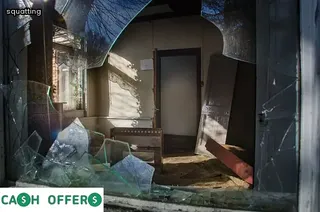Squatting in Massachusetts is an interesting and complex subject. It can be difficult to understand the laws surrounding squatting, but it is important to be aware of them as they vary from state to state.
Squatting in Massachusetts is regulated by the state's General Laws and has been a controversial issue for many years. In general, squatting is illegal in Massachusetts, however there are some exceptions that allow for certain types of occupations to take place on vacant land or buildings.
Squatters may also have rights to remain in a dwelling if they can prove residency prior to eviction. Furthermore, the court system may grant legal protections for squatters who can demonstrate ownership of property or proof of residence prior to eviction proceedings.
Understanding these laws can help protect those who are facing eviction or want to explore housing options outside the traditional market.

Squatting is generally defined as occupying an abandoned or unoccupied space or building without the consent of the owner. In Massachusetts, squatting is illegal and considered a form of trespassing.
So-called “squatters’ rights” refers to laws that protect a squatter from eviction by the owner if they have been living in a property for a certain length of time, even if they do not own it. However, there are many restrictions to this law in Massachusetts, so it is important for those considering squatting to be aware of their rights and obligations under state regulations before attempting to occupy any property.
The legal landscape surrounding squatters’ rights in Massachusetts can be complex and difficult to navigate, which makes having a comprehensive guide to understanding these laws essential for anyone considering taking up residence on someone else's land.
Adverse Possession in Massachusetts is a legal framework that provides squatters with the right to claim ownership of property they have resided on or maintained for a certain amount of time. The law makes it possible for those who meet certain qualifications to take possession of vacant land or homes that have been abandoned by their rightful owners.
To qualify as an adverse possessor, the occupant must prove that they have been in continuous and exclusive possession of the property for at least twenty years and also demonstrate payment of taxes and/or other financial obligations associated with the land. Additionally, they must show that they intend to maintain their ownership and use of the property, which can be done through such activities as making improvements or using it for agricultural purposes.
The law also requires occupants to give notice to any potential claimants before filing suit, so that those who may have a valid legal claim will have an opportunity to contest it. Specific time frames are specified for different types of occupancy, such as residential and commercial use, but all squatters must adhere to strict standards in order to gain title over the property.

In Massachusetts, Color of Title laws are an essential part of understanding the rights of squatters. These laws help to determine legal ownership of properties and dwellings by determining who has a legitimate claim to them.
To understand these laws, it is important to know that Color of Title refers to a person’s belief that they have a right to a property based on documents or records that appear legitimate, but may not actually be valid. These documents could include deeds, mortgages, tax bills, or other real estate records that make it appear as though the person claiming the property has a legal right to it.
While this does not always mean that the person actually owns the property in question, it can still allow them certain rights in regards to using and occupying the space. In Massachusetts, Color of Title laws give squatters certain rights when it comes to occupying land and housing; however, there are also limitations which must be taken into account before any action is taken.
It is important to understand the rights of squatters in neighboring states, as it can provide valuable insight into the rights of squatters in Massachusetts. Squatters’ rights are generally determined by a state’s laws and regulations, so understanding other states’ laws can give an idea of what is common practice across the country.
In most cases, if a squatter has been living on someone else’s property without their knowledge or permission for a certain amount of time, they may be considered to have acquired certain legal rights under certain conditions. Generally speaking, these conditions include continuously occupying the property for a period of time—known as “adverse possession”—and paying taxes on the land or making improvements to it.
Other states may also have specific rules and regulations regarding eviction procedures, which could be useful in better understanding how things work in Massachusetts. Therefore, exploring squatters' rights in neighboring states can help inform decisions about what is allowed and what is not when it comes to living on someone else's property without their consent.

In Massachusetts, there are a few strategies homeowners can take to protect against squatters. The first step is to ensure that the property is secured.
This requires checking all external doors for locks and making sure all windows are closed and locked. Additionally, it’s important to be aware of possible entry points such as gaps around windows or doors, as well as any weak points in the walls or floors.
It’s also wise to install security cameras around the perimeter of the property to monitor for any suspicious activity. Furthermore, it is important to regularly check public records for any claims made by potential squatters on the property.
Homeowners should also consult with their local zoning commission to make sure they are aware of any laws regarding squatting in their area and how they will affect them. Finally, homeowners should consider filing a restraining order against anyone who may be trying to unlawfully occupy their property so that proper legal action can be taken if needed.
Taking these steps can help Massachusetts homeowners protect themselves from potential squatters on their property.
In Massachusetts, squatters have a right to remain in a property if they have been living there without the owner's permission for more than 20 years. This is known as adverse possession and can be used to acquire title to the property, but there are some conditions that must be met first.
Investigating property tax requirements for squatters in Massachusetts can be complicated, as tax requirements vary depending on the municipality. Squatters must pay current taxes on the property and back taxes may be required as well.
It is important for squatters to determine who is responsible for paying delinquent taxes, although it is usually up to the owner of record until a court order changes that. Additionally, squatters should understand any restrictions on their occupancy rights such as zoning or building codes which may apply even if they are not legally registered owners of the property.
Ultimately, understanding all applicable laws and regulations concerning squatters and their rights in Massachusetts is key when considering how best to protect their interests.

If you are a homeowner in Massachusetts dealing with an unwelcome squatter, it is important to first understand the legal methods for removing them from your property. Squatters can be removed either through self-help measures or by filing a complaint in court.
Self-help measures include informing the squatter that they are trespassing and asking them to leave, using physical force to remove them, or changing the locks on the property. If self-help measures are unsuccessful, then a complaint may be filed in court for ejectment which is a civil action that requires proof of ownership of the property as well as evidence that the squatter has been occupying the premises without permission.
It is important to note that while there are legal means of evicting squatters, it is illegal to take matters into your own hands such as threatening or intimidating them or physically harming them. In addition, many local police departments lack resources to handle squatting cases so it is important to familiarize yourself with any local ordinances regarding squatting before taking any action.
Squatting, or occupying vacant land or property without permission from the owner, is a legal grey area in Massachusetts. To differentiate between squatting and trespassing under the law, it is important to understand the distinction between the two.
While both are considered illegal activities, squatting is a civil and not criminal offense. Trespassing, on the other hand, is a criminal offense and has harsher punishments attached to it than squatting does.
Squatting may involve an individual taking possession of a house or other real estate for habitation purposes without consent from the owner. In contrast, trespassing involves someone entering onto someone else's property without their consent and can include activities such as hunting or fishing without permission.
The key difference between squatters' rights and trespassing lies in the intention of each individual; whereas squatters have an intention to possess land or property for personal use, trespassers come onto private land for temporary recreational purposes only. Understanding this distinction is essential in determining whether an individual has violated either law in Massachusetts.

In Massachusetts, the issue of squatting on a property or occupying it without permission from the legal owner has been addressed in various court cases. One such case is that of Anderson v.
Good, in which the defendant was found to have unlawfully occupied a property for over three years and was granted restitution by the court. In another case, Commonwealth v.
Darcy, the defendant was charged with trespassing for squatting on someone else's land; however, the court found that since there had been no evidence of damage to the property or disruption of public order, there was insufficient proof to convict him. The Supreme Judicial Court case of Reitman v.
Shames also addressed squatting issues in the state and ultimately determined that even if a person is legally allowed to remain on a property, their continued presence may not be permitted if it interferes with an owner's right of possession. These cases demonstrate how courts in Massachusetts analyze squatting issues and provide insight into how individuals can protect their rights as owners or occupiers of real estate.
Squatting, the practice of occupying and living in an abandoned or unoccupied area of real estate, is illegal in most states. However, Massachusetts has a number of laws that provide some limited protection to squatters in certain situations.
Examining relevant statutes and regulations regarding squatting requires a review of the state's property codes, as well as the state's housing and real estate laws. In particular, Massachusetts' version of adverse possession law provides some protections for squatters who have occupied land for a period of time; any squatter who has been on the land for at least twenty years can lay claim to it through this statute.
Additionally, certain housing regulations provide rights to tenants who have been living on rent-controlled properties owned by absent landlords; these tenants may be able to retain their claims even if they were never officially listed on the lease. Finally, other statutes grant certain rights to individuals who are occupying industrial or commercial spaces; these provisions protect such occupants from eviction unless they are violating local zoning regulations.
Understanding how all of these pieces fit together can help Massachusetts residents better understand their rights when it comes to squatting on land or in buildings.
In Massachusetts, the shortest amount of time for squatters rights to be established is three years. This means that anyone who has occupied a building or property for at least three consecutive years can establish legal rights over the property.
Since these rights are established through continuous occupancy, the occupants must remain in residence in order to maintain their rights. This means that if an occupant leaves the property and returns after more than one year, they will need to re-establish squatters' rights by living there continuously for another three years.
Additionally, squatters’ rights can only be established if they are occupying a building or land in good faith. If there is an indication of fraud or malicious intent, any claim of squatter's right may not be held up in court.

Yes, adverse possession is recognized in Massachusetts. According to the state's laws, a squatter can acquire legal title to property they have been occupying for at least twenty years if they meet certain criteria.
The squatter must show that they have openly and notoriously occupied the property in question for at least 20 continuous years, paid taxes on the land, and used it as if it were their own. They must also have an actual possession of the land and have exclusive use of it for that time frame.
This means that any other use or occupancy of the land during this time would disqualify a squatter from claiming adverse possession rights. If all these conditions are met, then the squatter will be able to acquire legal title to the property.
Yes, Squatters' Rights are OK in Massachusetts, as long as certain conditions are met. According to the state's laws, Squatters' Rights mean that if a person takes possession of a property and inhabits it for a sufficient amount of time, then they can claim legal ownership of the property.
In order for persons to be granted these rights, they must meet several criteria including: living on the property for at least twenty years, taking action to improve or maintain the property, and paying all taxes associated with the real estate. Furthermore, because this is a complex area of law it is advisable that those wishing to exercise their rights seek legal counsel prior to doing so.
Ultimately, understanding Squatters' Rights in Massachusetts is an important part of owning or renting housing in the state. This comprehensive guide to Squatters' Rights provides insight into what is and isn't allowed when it comes to squatting on houses, housing and real estate in Massachusetts.
No, New Hampshire does not have squatters' rights. Squatters' rights, also known as adverse possession, are laws that allow a squatter to gain legal title to a property if certain conditions are met.
These laws are state-specific and vary from state to state. Massachusetts is one of the states that does have squatters' rights, as outlined in its comprehensive guide on the subject.
The guide details how squatters may gain legal ownership of houses, housing, and real estate in Massachusetts if they occupy it for a certain period of time and meet other criteria set forth by law. However, New Hampshire does not recognize adverse possession claims and therefore has no squatters' rights.